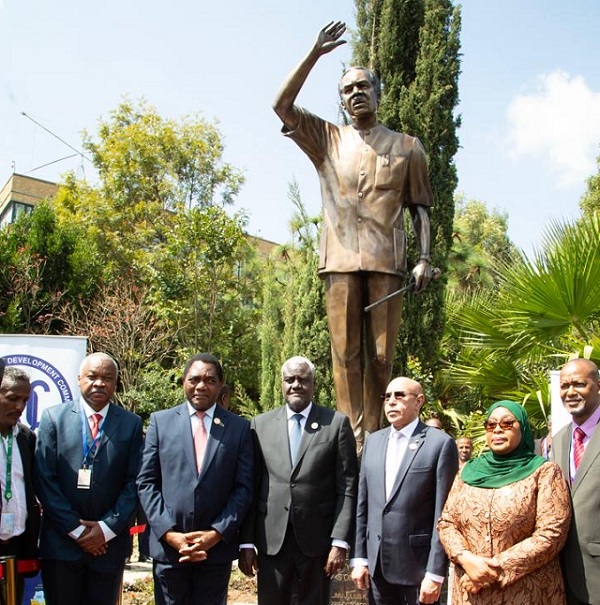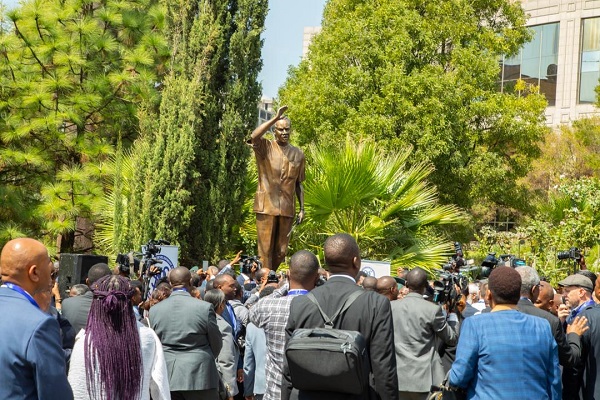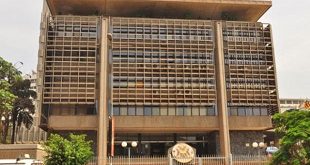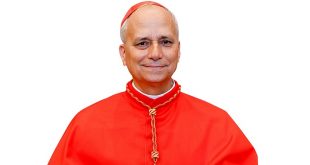
Catholic faithfuls continue to pray for former Tanzanian president’s sainthood
Addis Ababa, Ethiopia | RONALD MUSOKE | On the morning of Feb.18, the African Union alongside the Southern Africa Development Community (SADC) unveiled a commemorative statue of former Tanzanian President, Julius Kambarage Nyerere, during the 37th Ordinary Session of the Assembly of the African Union at the AU headquarters in Addis Ababa, Ethiopia.
President Nyerere’s statue is a tribute to his crucial role in Pan-Africanism and peacebuilding on the continent. Fittingly, the statue stands on the grounds of the building complex named in his honour. The complex hosts the African Union Political Affairs, Peace and Security Department.
Nyerere’s statue stands atop a granite base inscribed with his impactful words from October 22, 1959: “We would like to light a candle and put it on top of Mount Kilimanjaro which would shine beyond our borders giving hope where there was despair, love where there was hate and dignity where before there was only humiliation.”
As the first Prime Minister of independent Tanganyika in 1961 and shortly afterwards, the first President of the new state of Tanzania in 1964, Nyerere’s monument now stands alongside two other respected Pan-Africanist leaders at the AU headquarters.
In 2012, the statue of Ghanaian Pan-Africanist, Kwame Nkrumah, was unveiled followed by the statue of Emperor Haile Selassie in 2019, recognizing their significant contributions to the Organisation of African Union – the forerunner to the African Union.
Aligned with the 2024 AU theme of Education, Nyerere’s statue emphasizes his philosophy on education. He believed that education’s primary purpose is to transmit accumulated wisdom and knowledge to people, resonating with principles such as self-reliance, critical consciousness, equality, social justice, and common good. Nyerere’s innovative theory also links education for liberation to the goal of building an egalitarian society based on Ujamaa.
The unveiling ceremony took place in the presence of Mohamed Ould Ghazouani, President of Mauritania and the AU Chairperson; Moussa Faki Mahamat, the Chairperson of the African Union Commission and, several SADC leaders including, President Samia Suluhu Hassan of Tanzania, President Hakainde Hichilema (Zambia), President João Lourenço (Angola), President Emmerson Dambudzo Mnangagwa (Zimbabwe), President Cyril Ramaphosa (South Africa), and Prime Minister Pravind Jugnauth, (Mauritius). President William Ruto (Kenya), Prime Minister Abiy Ahmed (Ethiopia) and Jessica Alupo, the Vice President of Uganda attended the event. Former Tanzanian President, Jakaya Kikwete and former AU Chairperson, Nkosazana Dlamini-Zuma, also attended the function.
President Nyerere’s legacy
Speaking during the unveiling ceremony, Moussa Faki Mahamat, the African Union Commission Chairperson said President Nyerere’s legacy as a remarkable leader “encapsulates the essence of Pan Africanism, profound wisdom, and service to Africa.” Faki said Nyerere played “a key pioneering role in the establishment of the Organization of African Unity (OAU) in 1963, a milestone event in our pursuit of African unity.”
Nyerere’s commitment to African unity, Faki noted, went beyond national boundaries and national interest. This, he said, is reflected in Nyerere’s own words to the Tanzanian Parliament in 1970: “We must stand by our brothers fighting for freedom in southern Africa. Their struggle is our struggle, and their victory is our victory.”
During Nyerere’s 24-year leadership, Tanzania became a sanctuary for liberation movements across the continent. The Organization of the African Unity Liberation Committee founded its headquarters in Tanzania until the dismantling of the Apartheid system in South Africa in 1994.
Dar es Salaam, Tanzania’s former capital, was not only a safe haven for African liberation movements but also for the Palestine Liberation Organization (PLO) and Latin American freedom fighters.
A teacher by profession (hence the moniker ‘Mwalimu’), Nyerere played a crucial role as mediator in African conflicts, particularly the crisis in Burundi. He remained a ‘wise statesman’ who gave his counsel and advice selflessly to the Union until the end of his life, Faki said.
“It is befitting that we honour his memory today as we rename this building to the Mwalimu Nyerere Political Affairs Peace and Security building,”Faki said on Feb.18.
Tanzania is proud of Nyerere
Many political commentators in Tanzania and East Africa commend Mwalimu Julius Nyerere for “building a nation from scratch; jealously protecting its natural resources and preaching the equality of people.”
Nyerere is also credited for his indefatigable effort to get the best out of Africa’s social structure. For instance, under his administration’s socialism and self-sufficiency policy known as Ujamaa, Nyerere rejected the idea that an African country should depend on the West, especially after independence.
Years later, in retirement, he recalled how he inherited a state with 85% of the adult population illiterate. He noted that for the 43 years the British colonialists ruled Tanzania, not much was achieved in human capital development.
“When they (British) left, we were left with two engineers and 12 doctors. When I resigned, 91% of the population was literate and practically all children attended school. We trained thousands of engineers and doctors and teachers,” he said, as per The East African.
Emmanuel Kihaule, a former Tanzanian journalist, told The Independent on March 21 that Tanzanians are very proud of the African Union for having given such an honour to erect a statue of President Nyerere at the African Union headquarters in Addis Ababa.
Kihaule said: “He (Nyerere) was an exceptional and selfless human being; he believed in human equality and he could not withstand any exploitation or humiliation of human beings, not just in Africa but anywhere in the world.”
“That is why he was even ready to delay Tanzania’s independence until the whole of Africa was free. He made Tanzania the headquarters of the liberation struggle for southern Africa and Tanzania took a leading role in the independence struggles of Mozambique, Angola, Zimbabwe, South Africa and many other African countries.”
“(American civil rights activist) Malcolm X came to Tanzania in 1963; Vladimir Putin (current president of Russia) also came here to lead the training of southern African freedom fighters in the 1970s; the Cuban President, the late Fidel Castro also came to Tanzania and so did, Ernesto Che Guevara, who led several liberation struggles in Latin America and DR Congo.”
Many Tanzanians revere Nyerere because he served his country selflessly and often refer to him as “Mr Clean,” because of his disdain for corruption. Kihaule says despite Nyerere leading Tanzania for 24 years, when he retired, he was just like any ordinary Tanzanian citizen. “He did not amass any wealth. In fact, the house he had in his village was built for him by the army and the house he lived in Dar es Salaam, belonged to the government.”

“Mwalimu never gave any preferential treatment to his children to access education (political posts). In fact, most of his children only started getting some political positions after his demise, not when he was alive. This is the kind of person that we are very proud of.”
Nyerere united Tanzania with Kiswahili
Kihaule told The Independent that Nyerere’s most enduring legacy is probably the fact that he managed to unite a country with more than 100 ethnic groups using the Kiswahili language.
“It is Nyerere who declared Kiswahili as a national language on 7 July, 1954, and this was the tool he used to mobilize citizens for the independence struggle. He used the same language to unite us,” he told The Independent.
“In fact, Tanzania could be the only African country that has one local language that unites all citizens and we are very proud of it. Now Kiswahili is an official language at the African Union; it’s an official language at the EAC, it is also an official language at SADC and it is taught in over 100 universities around the world. It’s a national language in at least five countries and it’s taught in public schools in at least 10 countries. It has over 300 million speakers around the world.”
“Kiswahili is also recognized by the United Nations and we have July 7 marked as a day to commemorate the Kiswahili language. Soon, we know for sure that Kiswahili will be adopted by the United Nations as one of the official languages.”
Similar sentiments are shared by Fabien Bakundukize, a retired Burundian journalist. He says Mwalimu Nyerere is widely seen in Burundi as a progressive president who supported Burundi in its struggle for independence from Belgium.
“He worked closely with Burundian Independence leader, Prince Louis Rwagasore, whom he admired very much but was later disappointed by Burundian leadership when he saw the mass killings that occurred later after independence in 1962.”
“He hosted thousands of Burundian refugees who had sought exile in Tanzania fleeing for safety in 1972. Following the civil war that broke out in Burundi in the early 1990s, President Nyerere was the first to initiate the famous Arusha Peace Agreements.”
Kihaule told The Independent that Mwalimu Julius Nyerere may have made some mistakes along the way during his 24-year rule but, at least, he was always ready to apologize when he erred. “So, we are very proud of him and we always pray for him,” said Kihaule.
Push for Nyerere sainthood
Following his death in 1999, there was an immediate push for Mwalimu Nyerere to be declared a “Saint” within the Catholic Church–the religion he professed.
Experts on the Catholic religion say, in order for anyone to be a candidate for sainthood, his life must have exceeded human nature; he or she must have lived a life inspired by the Gospel and cast-off human traits that are not in line with the teachings of the Gospel. He or she must also have performed miracles in their lifetime that have been proven to be connected to divine powers, or at least lived a life that was above normal.
President Nyerere is not known to have performed any miracle, but his admirers, especially those of the Catholic faith see his life as the head of state and his Pan-African independence struggle as heroic.
According to Canon Law 1187 of the Catholic Church, the procedure for sainthood starts after the death of a worthy individual. It involves the “opening of the Cause of Beatification and ends with canonization,” with the Pope first declaring that person a servant of God, and after Beatification, “the Venerable” and after, canonization “a saint.”
In 2005, the Symposium of the Episcopal Conferences of Africa and Madagascar (SECAM), led by the late Bishop Justin Samba of the Diocese of Musoma and the Tanzanian Episcopal Conference requested the Pope in Rome to declare Mwalimu Julius Nyerere a saint.
In response, Pope Benedict XVI declared Nyerere on May 13, 2005 a “Servant of God” which is the first step of the beatification and canonization of a deserving individual into sainthood.
In 2006, the Vatican opened the causes for his beatification and canonization after having conferred him the status of a Servant of God, meaning a “historical and theological commission” embarked on the process of studying his life. They have since been reading his writings and interviewing people who knew him. His life and works will continue to be examined by the Catholic Congregation for the cause of saints.
“Through this process, the faithful are required to report any thing they know about the candidate, be it positive or negative. A panel that discusses the life of a candidate is composed of God’s advocates who argue that the candidate deserves the title, and the devil’s advocates, who argue the opposite.”
“There is no doubt that President Nyerere had good qualities as a political leader but the fact that he was a politician might make his journey to sainthood a bit longer and harder,” says Father Godfrey Ssemwogerere Kato, a parish priest of Holy Trinity Church, Kamwokya, in Kampala.
“He loved his religion and I hear he used to pray a lot and repent his sins. But his being a politician also means that he had political opponents who might have slighted him and he possibly punished them. In the realm of spirituality, that might be interpreted as retaliation.”
A special prayer has also been written for the Catholic faithful to recite so that God, through the intercession of Nyerere, can perform miracles that will then “be proven to be beyond what science can understand.”
“Should the prayers yield at least two miracles, then the church will consider that as proof that he is in heaven and the Pope will declare Nyerere “Venerable,” Fr. Ssemogerere said.
In Uganda, a mass has been organized since 2014 during the annual Uganda Martyrs’ Day commemoration (June 3) at Namugongo Martyrs Shrine, on the outskirts of Kampala to remember Nyerere’s contribution to his country and Africa.
Maria, Nyerere’s widow, who has championed the beatification of his late husband, has performed several pilgrimages to Namugongo to invoke the intercession of the Uganda Martyrs, who were canonized as saints by the Catholic Church in 1964.
During the maiden mass, President Yoweri Museveni called upon all believers to pray for Nyerere’s beatification and canonization as a saint. In 2017, President Museveni said, just like the Uganda martyrs, Nyerere had the courage while fighting for the liberation of other African countries from colonial rule in spite of being weak.
“As a witness to Mwalimu’s good works on earth, the fearlessness he had when fighting for justice, I will be happy if he is canonized,” Museveni said.
In 2019, during the Uganda Martyrs Day celebrations, President Yoweri Museveni told the pilgrims he is indeed “duty bound” to celebrate the life of President Julius Nyerere and also pray that he get recognized as a saint. “Nyerere is my parent, and Mama Maria is my mother. Nyerere worked to unite us through politics and now Mama Maria is doing it through the Church.”
“By the fact that Rome accepted him to be called a servant of God is in itself a sign that Nyerere deserves our prayer so that he can perform miracles and get canonized,” said Bishop Cyprian Kizito Lwanga, the late Archbishop of Kampala, who led the special mass for Nyerere’s canonization in 2019.
 The Independent Uganda: You get the Truth we Pay the Price
The Independent Uganda: You get the Truth we Pay the Price



